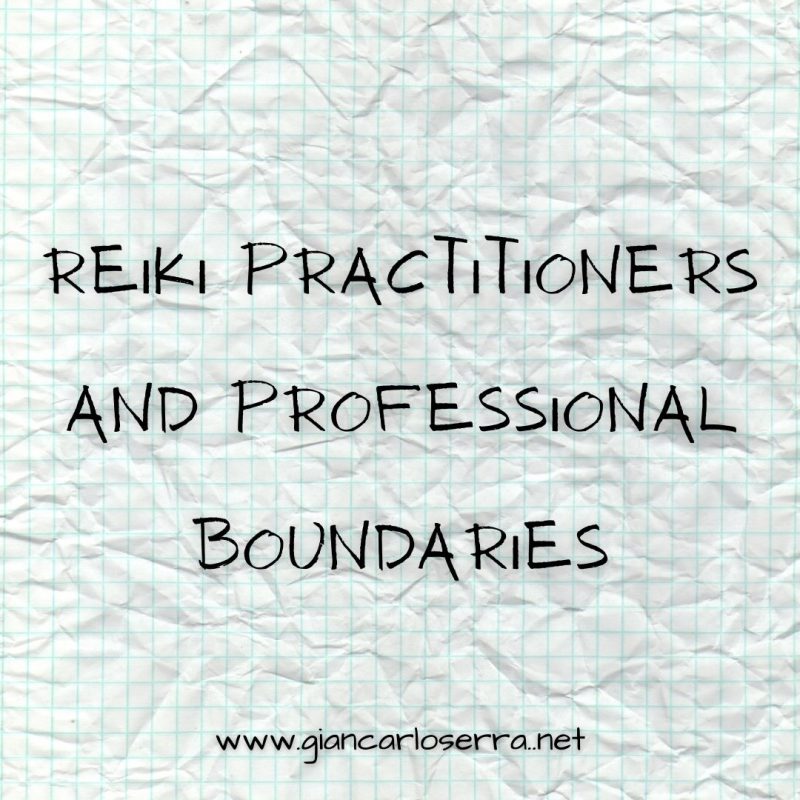
What Are Professional Boundaries?
Professional boundaries are the framework within which the Reiki practitioner-client relationship occurs. These boundaries are meant to ensure that relationships between a Reiki practitioner and his/her clients remain professional.
Reiki practitioners are expected to uphold key boundaries to protect themselves, their clients and any organisation they may be working for.
These are a few of the major boundaries that may have implications for your practice and behaviour.
– Client focus. Reiki practitioners are expected to place the needs of service users on your caseload at the centre of any decisions that you make about them and their lives.
– Self-disclosure. Information about yourself and your personal life should not be disclosed to clients.
– Dual relationships. You should not hold more than one type of relationship with a client, for example, they cannot work for you, be a family member or receive extra private support from you, as well as be one of your clients.
– Working within your competence. It is important that you understand the limitations of your role and of your personal capabilities, and when to refer to other professionals or to seek further support and advice for yourself and your clients.
– Looking after self. It is your responsibility to ensure that you are in a fit state to do the job that you are required to do. This covers not only your behaviour outside work but also how you manage your stress and emotions within work and caused by your work.
Professional boundaries are important because they provide safety for both the Reiki practitioner and their clients, increasing the wellbeing of the clients by providing a therapeutic environment underpinned by mutual respect. Making and agreeing clear roles and rules reduces any anxiety around the Reiki practitioner/client relationship.
Poor professional boundaries can result in increased stress between the Reiki practitioner and their client, undermining the professional relationship and leading to a potentially unsafe practice.
Professional Code of Conduct and Code of Ethics establish what these professional boundaries are. The Code of Conduct for Reiki practitioners below has been agreed by the Reiki Council in the United Kingdom.
Code of Conduct and Ethics
The Reiki Council is the lead advisory body for Reiki practitioners in the UK. Through its member associations it represents the views of people giving Reiki to the public across the UK.
The Reiki Council is non-profit-making organisation that sets standards and guidelines, provides information and advice.
This Reiki Council’s Code of Conduct and Ethics is intended for guidance and assistance to Professional Reiki Practitioners
and to protect the interests of the public. It describes the standards of conduct and practice required of professional Reiki practitioners.
The purpose of the Code of Ethics and Practice for Reiki and its procedures is to ensure that any complaint made to the regulator is dealt with in a fair, clear and impartial manner.
Professional Reiki practitioners should operate in accordance with the Code of Ethics and Practice for Reiki and are expected to maintain high standards of care, competence and conduct.
What Does the Code of Conduct and Ethics say about professional boundaries
The Reiki Practitioner shall:
a. maintain the highest professional standard of relationships with clients and other healthcare professionals. Care, skill and integrity shall be demonstrated at all times.
b. work in a co-operative manner with healthcare professionals and practitioners, recognising and respecting their particular contribution.
c. not undermine a client’s faith in any form of treatment or regime and respect the client’s choices.
d. not encourage clients away from professional colleagues.
e. not exploit their clients financially, sexually, emotionally or in any other way. The Reiki practitioner will not undertake any form of sexual activity/relationship with a client in their care.
f. state that Reiki does not require the removal of clothing.
g. not offer Reiki in place of conventional medical treatment.
h. never give a diagnosis of a medical condition to a client in any circumstances as part of the practice of Reiki.
i. never prescribe or sell remedies and health products as part of the practice of Reiki.
j. not countermand instructions or prescriptions given by a doctor. It must be left to the client to make his/her own decision in the light of medical advice.
Reiki practitioners shall refer the client back to their medical advisor if the client asks them for any medical advice.
k. a Reiki Practitioner should be aware of their own professional limitations and work only within their own scope of practice, referring clients elsewhere if/when the need arises.
READ ALSO
Giancarlo is a fully qualified Spiritual Healer, Reiki Master, Hypnotherapist and Past Life Regression Therapist. He is a Consultant Expert Healer of the College of Psychic Studies in London.
He is a Master Teacher member of the UK Reiki Federation and registered with the Complementary & Natural Healthcare Council, Federation of Holistic Therapists, the Spiritual Regression Therapy Association and the General Hypnotherapy Register. Read more.



















